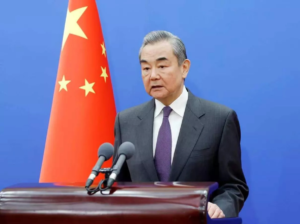
Information that China’s Foreign Minister Wang Yi said Ukraine is viewed as a “friend and partner” is confirmed by China’s official statements. The remark was made on February 15, 2025, during Wang Yi’s meeting with Ukraine’s Foreign Minister Andrii Sybiha on the sidelines of the Munich Security Conference, Xinhua reported.
According to Xinhua’s publication, Wang Yi noted that China and Ukraine maintain a “traditional friendship,” and that bilateral relations are based on the strategic partnership established in 2011. He also said Beijing is ready to work with Kyiv to advance bilateral relations and practical cooperation despite “unfavorable factors.”
In 2026, the topic of China–Ukraine contacts was again brought to the fore at this year’s Munich conference. Ukraine’s Foreign Minister Andrii Sybiha said on February 13, 2026, that he invited Wang Yi to visit Ukraine and stated that China could help achieve an end to the war.

According to Serbian Economist, Ukrainian President Volodymyr Zelensky held a telephone conversation with Serbian President Aleksandar Vucic, during which the parties discussed European integration in detail and agreed to stay in touch. Zelensky reported on the conversation on his Telegram channel. The leaders also touched on coordination on regional security and the immediate international agenda.
We remind you that the day before, the European Commission published its annual reports on EU enlargement. The document on Serbia notes both the advanced elements of reforms and sensitive issues of foreign policy alignment with the EU. Vučić publicly reiterated his position that membership should be assessed on the basis of merit criteria rather than political alignment, against the backdrop of discussions on sanctions policy and dialogue on Kosovo.
At the same time, Kyiv is seeking to accelerate its own negotiation track with the EU. On the day the enlargement package was published, Zelensky called for the process to be brought to the opening of all clusters and for accession to be targeted by 2030, recognizing the need for further anti-corruption and institutional reforms.
In the context of the European Commission’s report, Belgrade is set to engage in dialogue with Brussels on aligning its foreign policy and economic agreements, while Kyiv is focusing on implementing recommendations for the next stage of negotiations. The positions of the leaders following the conversation indicate a willingness to maintain working contacts and exchange experiences in sectors related to the European agenda.
The previous confirmed call between Zelensky and Vučić took place on May 22, 2025.
https://t.me/relocationrs/1685

Ukraine has announced the severance of diplomatic relations with the Republic of Nicaragua in response to Managua’s decision to recognize Crimea, which is temporarily occupied by Russia, as well as parts of the Donetsk, Luhansk, Zaporizhzhia, and Kherson regions as part of the territory of the Russian Federation, the Ministry of Foreign Affairs reported.
“This decision is a gross violation of the UN Charter and international law. Support for Russia’s armed aggression and recognition of the so-called ”DPR“ and ‘LPR’ indicates the political identification of the Managua regime with the aggressor state,” the Ukrainian Foreign Ministry said.
Foreign Minister Andriy Sibiga stressed that Kyiv will continue to respond harshly to any attempts to undermine Ukraine’s sovereignty and territorial integrity.
Diplomatic relations between Ukraine and Nicaragua were established on September 6, 1992. Ukraine’s interests in Nicaragua were represented by the embassy in Mexico, and consular functions were performed by the Consulate General of Ukraine in Havana (Cuba).

Ukrainians’ attitude towards Belgium is mostly positive, although a significant portion of respondents take a neutral position. This is evidenced by the results of a nationwide sociological survey conducted by Active Group in collaboration with Experts Club in August 2025.
According to the results, 54.7% of Ukrainians have a positive attitude towards Belgium (35.3% — mostly positive, 19.3% — completely positive). Only 2.7% of citizens expressed a negative attitude (0.3% — mostly negative, 0.3% — completely negative). At the same time, 43.0% of respondents remain neutral, and 2.3% said they do not have enough information about the country.
“Belgium is perceived by Ukrainians as an important member of the European Union and NATO, a country that consistently supports Ukraine on the international stage. At the same time, its relative remoteness and lack of deep historical ties account for the high proportion of neutral assessments,” explained Active Group founder Oleksandr Pozniy.
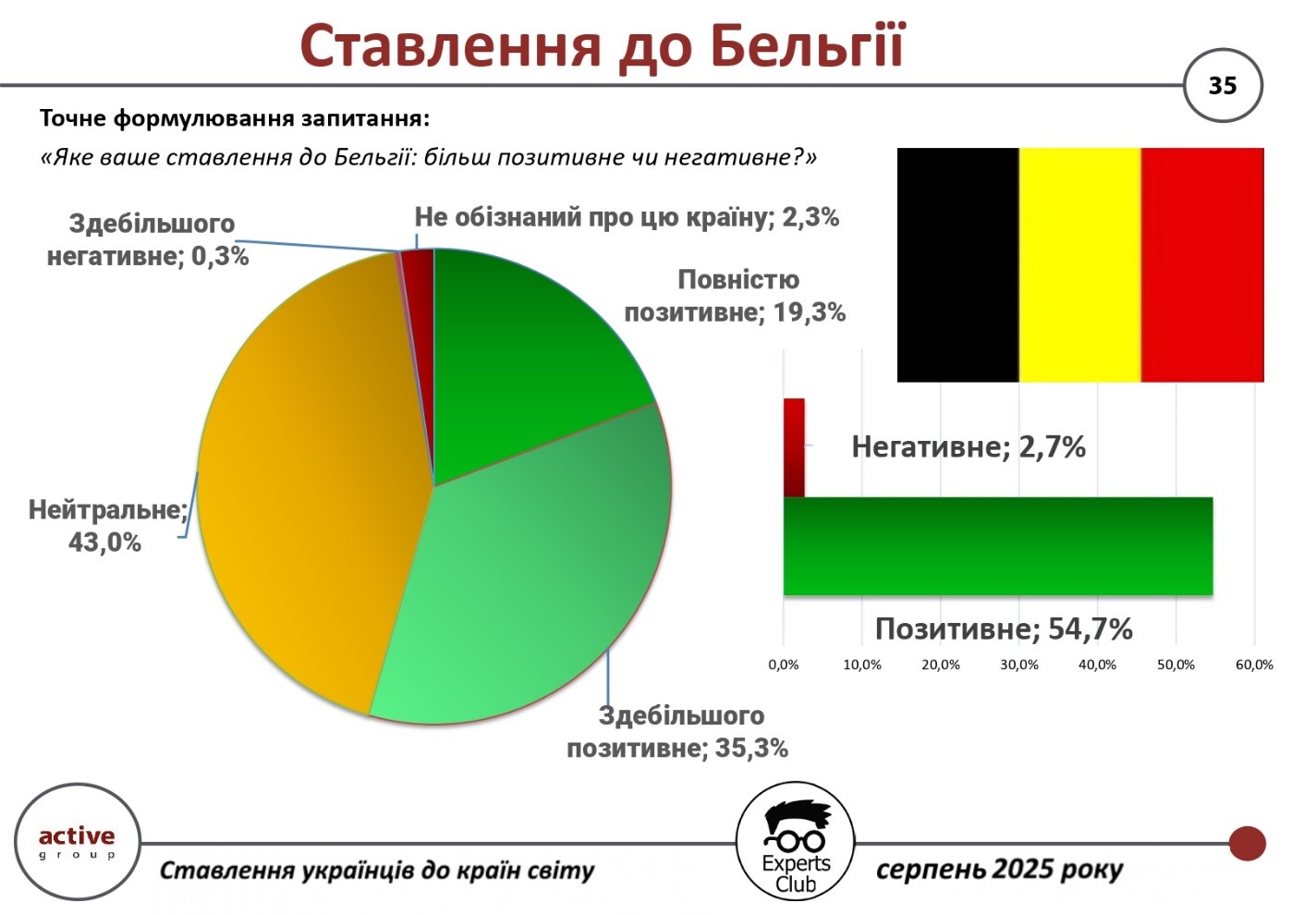
In turn, co-founder of Experts Club Maksim Urakin drew attention to the economic component of bilateral relations:
“In the first half of 2025, trade turnover between Ukraine and Belgium amounted to more than $584 million. Ukrainian exports amounted to about $235 million, while imports from Belgium exceeded $348 million. This resulted in a negative balance of $113.8 million, which highlights the Ukrainian market’s dependence on Belgian goods,” he emphasized.
The study is part of a broader project aimed at examining the international sympathies and antipathies of Ukrainians in 2025.
The full video can be viewed at: https://www.youtube.com/watch?v=YgC9TPnMoMI&t
You can subscribe to the Experts Club YouTube channel here: https://www.youtube.com/@ExpertsClub
ACTIVE GROUP, BELGIUM, DIPLOMACY, EXPERTS CLUB, Pozniy, SOCIOLOGY, TRADE, URAKIN
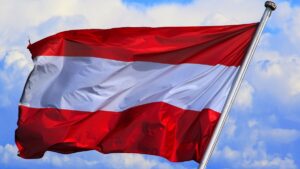
Ukrainians’ attitude towards Austria is generally positive, but a significant proportion of respondents remain neutral. These are the results of a nationwide sociological survey conducted by Active Group in cooperation with Experts Club in August 2025.
According to the survey, 48.7% of Ukrainians expressed a positive attitude towards Austria (37.0% — mostly positive, 11.7% — completely positive). Only 4.7% of citizens demonstrated a negative attitude (4.3% — mostly negative, 0.3% — completely negative). At the same time, the largest group — 44.7% of respondents — took a neutral position, while another 2.3% said they did not have enough information about the country.
“Austria is traditionally perceived by Ukrainians as a European country with high social standards, cultural heritage, and a stable political system. Although Austria is not Ukraine’s main partner in foreign policy, the overall level of sympathy remains positive,” emphasized Active Group founder Oleksandr Pozniy.
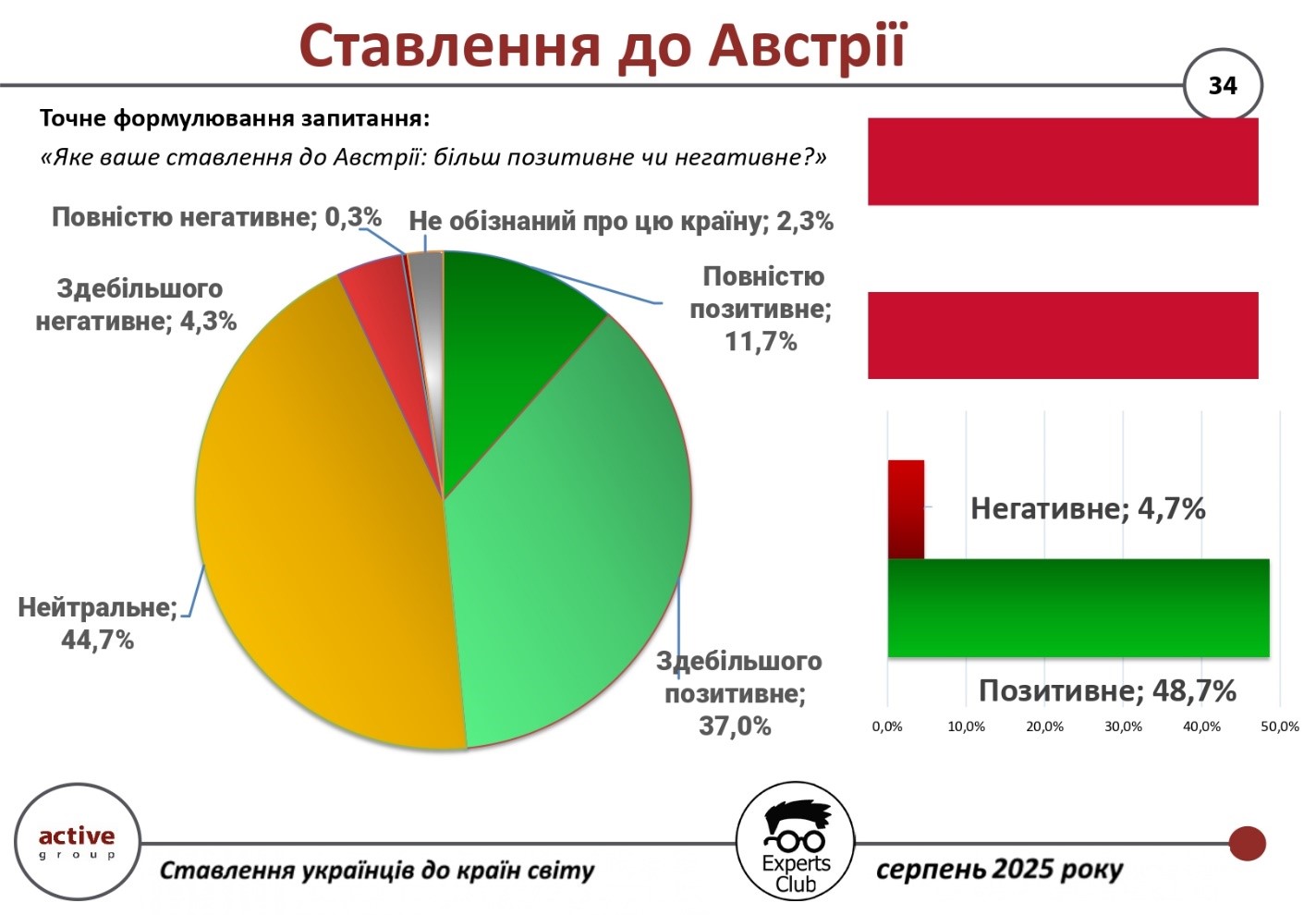
In turn, co-founder of Experts Club Maksim Urakin drew attention to the economic component:
“In January–June 2025, the total trade volume between Ukraine and Austria amounted to over $701 million. At the same time, exports of Ukrainian goods reached $276 million, while imports from Austria amounted to about $425 million. This led to a negative balance of $148.9 million, which indicates a significant advantage of Austrian exports over Ukrainian ones,” the expert emphasized.
The survey is part of a large-scale study of Ukrainians’ international sympathies and antipathies, reflecting not only political and cultural aspects, but also economic aspects of relations with various countries.
The full video can be viewed at: https://www.youtube.com/watch?v=YgC9TPnMoMI&t
You can subscribe to the Experts Club YouTube channel here: https://www.youtube.com/@ExpertsClub
ACTIVE GROUP, AUSTRIA, DIPLOMACY, EXPERTS CLUB, Pozniy, SOCIOLOGY, TRADE, URAKIN
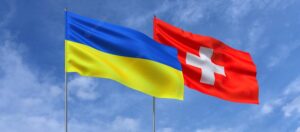
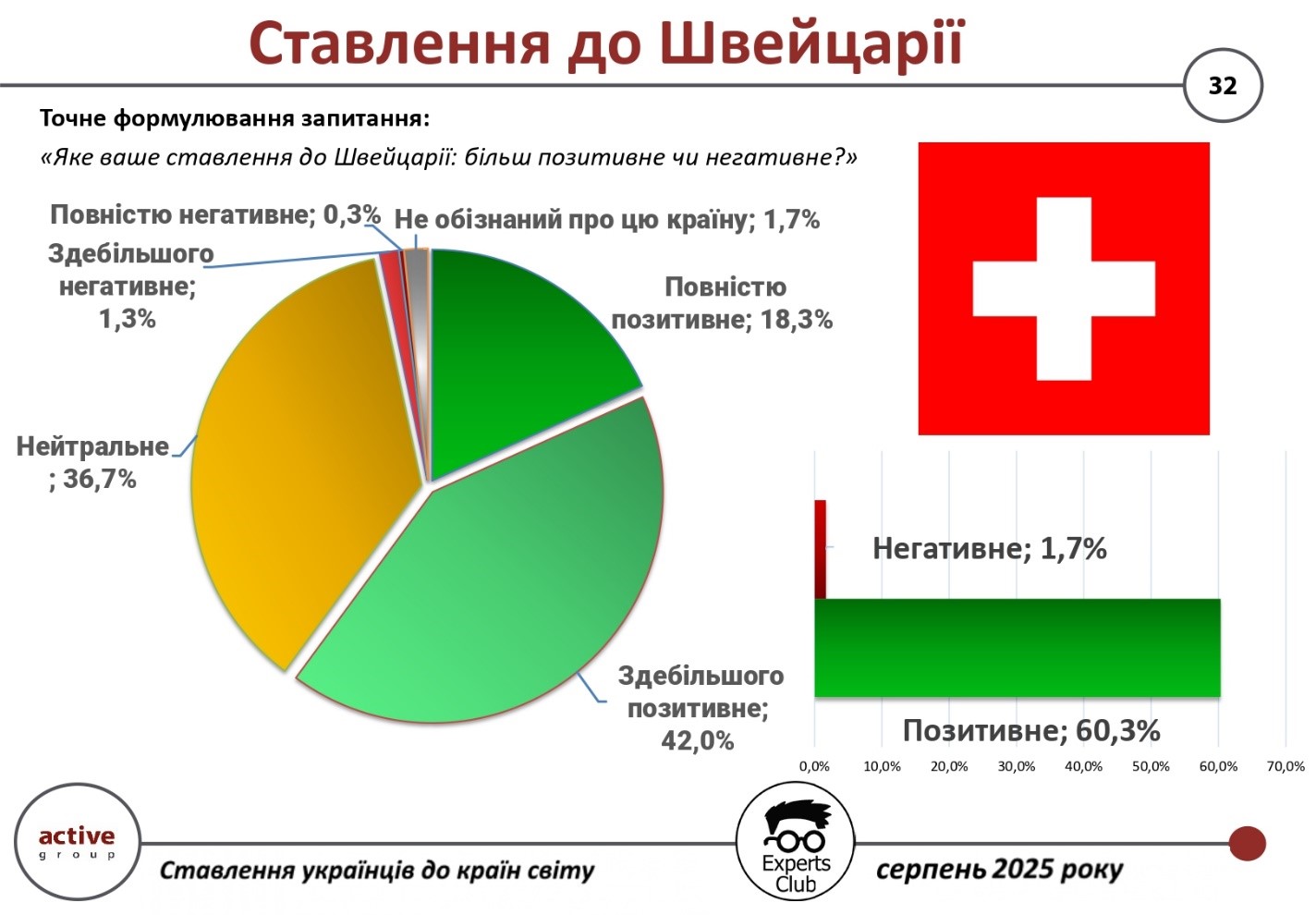 1
1
The majority of Ukrainians express a positive attitude towards Switzerland, although a significant number of respondents remain neutral. This is evidenced by the results of an all-Ukrainian sociological survey conducted by Active Group in cooperation with the Experts Club information and analytical center in August 2025.
According to the data, 60.3% of Ukrainians have a positive attitude towards Switzerland (42.0% – mostly positive, 18.3% – completely positive). Only 1.7% of respondents expressed a negative attitude (1.3% – mostly negative, 0.3% – completely negative). At the same time , 36.7% remain neutral, and 1.7% said they did not have enough information about the country.
“For Ukrainians, Switzerland is associated with reliability, stability and humanitarian support that the country provides in difficult times. The high level of trust reflects the positive image of Switzerland, despite its certain detachment from global politics,” commented Alexander Poznyi, co-founder of Active Group.
In his turn, Maxim Urakin, founder of Experts Club, focused on economic ties:
“In the first half of 2025, trade between Ukraine and Switzerland exceeded $928 million. At the same time, Ukrainian exports amounted to only $44 million, while imports from Switzerland reached almost $884 million. The negative balance of more than $839 million is significant, indicating Ukraine’s significant dependence on imports from this country,” he emphasized.
The survey was part of a broader program of research on international sympathies and antipathies of Ukrainians in the current geopolitical context.
The full video is available here:
https://www.youtube.com/watch?v=YgC9TPnMoMI&t
You can subscribe to the Experts Club YouTube channel here:
https://www.youtube.com/@ExpertsClub
ACTIVE GROUP, DIPLOMACY, EXPERTS CLUB, Poznyi, SOCIOLOGY, SWITZERLAND, TRADE, URAKIN